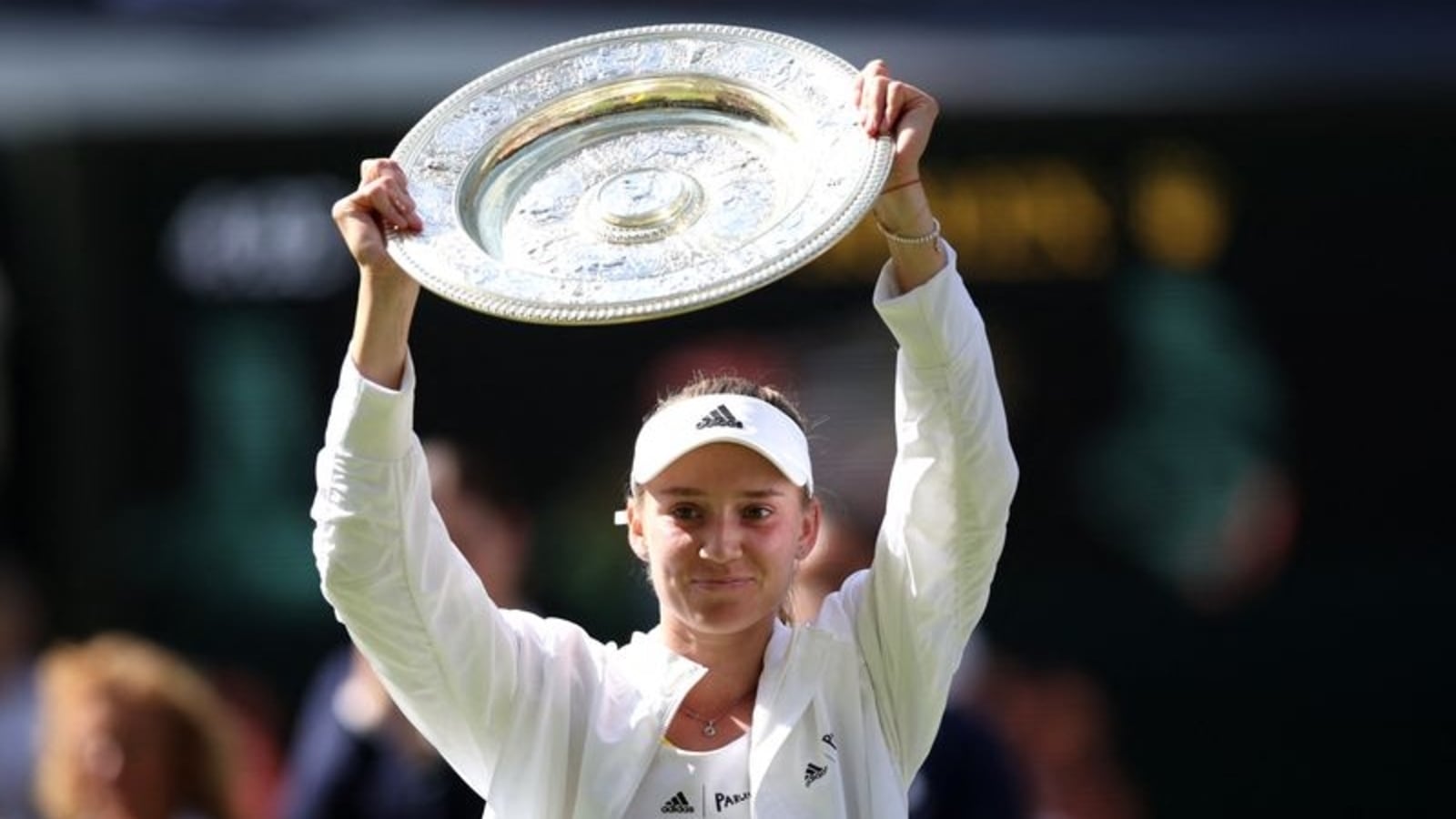 Russian-born Elena Rybakina wins it for Kazakhstan | Tennis Information
[ad_1]
Russian-born Elena Rybakina wins it for Kazakhstan | Tennis Information
[ad_1]
It was as if she’d received the primary spherical. As Ons Jabeur’s backhand drifted vast, Elena Rybakina merely smiled and glanced at her field. A handshake on the internet, a number of claps and a wave to the group was all that was to come back from the subdued celebrations.
It was solely after a few minutes that the 23-year-old’s actions matched the accomplishment. Rybakina obtained up from her chair and climbed in direction of her field, hugging members of her crew, sister and the president of Kazakhstan’s tennis federation.
Extra like a freshly topped Wimbledon champion.
As Rybakina is, the world No 23 engineering a gritty turnaround towards the second-ranked Tunisian to win the ladies’s singles last 3-6, 6-2, 6-2 on Saturday. Rybakina is the primary Grand Slam winner from Kazakhstan, having switched nationality from Russia in 2018 on account of higher monetary help from the Kazakh affiliation.
Thus the Moscow-born, in a event that banned Russian and Belarusian gamers after Russia’s invasion of Ukraine, acquired the Venus Rosewater dish from the Duchess of Cambridge on Centre Court docket.
“I’m really speechless,” Rybakina deadpanned. “I used to be tremendous nervous earlier than and through the match. I’m completely satisfied that it completed, truthfully. I’ve by no means felt one thing like this.”
Comprehensible, given this was solely her second primary draw look at Wimbledon after a fourth-round loss final 12 months. Rybakina’s rise within the skilled circuit has been equally steep, although glimpses of her immense potential got here early.
In considered one of her first appearances on the WTA tour, Rybakina, ranked 450th, beat the then world No 7 Caroline Garcia within the Spherical of 16 on the 2018 St Petersburg occasion. It was solely after finishing college that Rybakina, whose idols are Roger Federer and Justine Henin, determined to immerse within the sport.
After the federation change, Rybakina began working full time with present coach Stefano Vukov, the previous Croatian participant, in 2019. The affect was immediate. A career-best season, WTA title in Bucharest and zoom to finish the 12 months as world No 36 (from one hundred and seventy fifth at 2018 finish) adopted. She beat Serena Williams in final 12 months’s French Open to enter her maiden Slam quarter-final, a bar she felt was too excessive for this Wimbledon.
“I didn’t count on that I’m going to be within the second week,” Rybakina stated. “To be the winner is truthfully superb.”
So has her tennis been for the final two weeks. Rybakina’s robust serve, with a tournament-leading 49 aces within the first six matches, and energy sport, had been too sizzling for even the 2019 winner Simona Halep to deal with within the semi-final.
As if to set the template for the intriguing duel of contrasting types, Rybakina raised the curtain on the ultimate with a giant unreturned serve. Jabeur, the primary Arab lady enjoying at this stage, was doing her factor: taking the tempo off the ball, chipping and slicing to offset Rybakina’s play. The Tunisian discovered success, a chipped forehand giving her a break likelihood, which was transformed on account of a Rybakina backhand error within the third sport.
The world No 2 was not solely countering Rybakina’s serves with high quality returns but additionally serving strong. At 3-2, 30-30, Jabeur fired an unreturnable serve down the T. In reality, it was Jabeur who had higher numbers throughout the service parameters within the first set: aces (2 to 0), first serve in (75% to 58%), factors received on first serve (80% to 53%) and second (80% to 50%). Her greatest weapon neutralised, Rybakina’s errors had been all of the extra evident. A wayward forehand to again up a double fault within the ninth sport gave Jabeur three set factors, which she transformed on the first time of asking.
However as she stood to obtain serve to start the second set, Rybakina activated the mode that noticed her drop only one set earlier than the ultimate. She cranked a forehand up-the-line winner whereas additionally successful a backhand slicing battle to interrupt within the first sport. Jabeur continued to place stress on the Rybakina serve—she received not one of the 4 break factors within the set—however the Kazakh’s improved serve and incisive winners pulled her out of hassle.
As winners flew from Rybakina’s racquet—they practically doubled to 13 within the second set—Jabeur’s physique language displayed frustration. The rattled Tunisian dished out errors of her personal as an extended forehand widened the hole to 5-2. Fittingly, Rybakina sealed the set with an ace and a maintain to like.
By now, Rybakina was dictating the rallies in addition to standing as much as Jabeur’s selection with aplomb; an excellent response to Jabeur’s drop shot and volley obtained her into the lead good and early once more within the deciding set. The Tunisian’s contact—the drops and lobs feeling heavier—went lacking. It returned briefly within the sixth sport the place Jabeur had three break factors, just for Rybakina to save lots of them with huge first serves and larger groundstrokes.
That essential maintain meant there was to be no last twist to the story, scripted oh-so-nonchalantly by the first-time finalist.
[ad_2]







0 comments